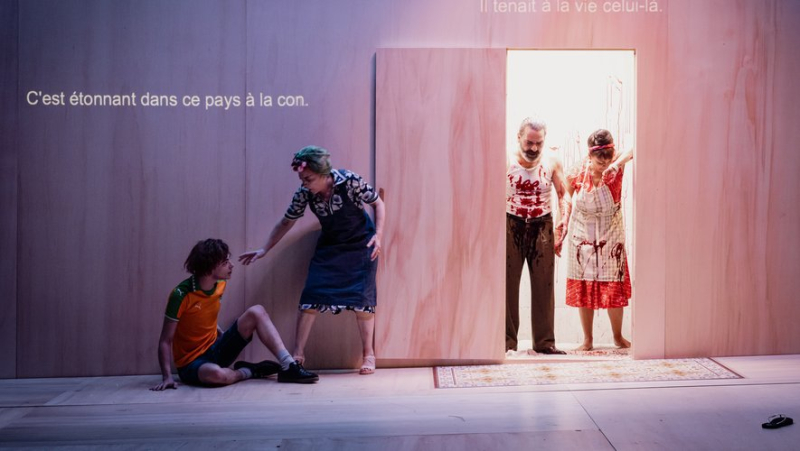“Wedding Days at the Cromagnons” by Wajdi Mouawad shook up the Spring of Actors

The tragedy of the Beirut situation mentioned by Wajdi Mouawad does not prevent the funny or the grotesque. Simon Gosselin
Two months after having to cancel the creation of his last play in Beirut, for obscure reasons, the Lebanese-Canadian playwright Wajdi Mouawad was finally able to create his new play Journees de noces chez Cromagnons as part of the Spring of Comedians, Montpellier.
It’s at the Le Monnot theater in Beirut, where the story, told in Arabic, is set, that the immense Franco-Lebanese author, director and actor’ nbsp;Wajdi Mouawad should have created his new piece Wedding Day at the Cromagnons. But due to a campaign against him, which some consider too pro-Israeli, the management was forced to cancel the performances initially planned from April 30 to May 19. In a country experiencing high tensions due to the war between Hamas and Israel, the risk was too great. It was therefore at the Spring of Comedians that his creation found refuge and consecration from June 7 to 9, before joining the next spring (without capital letters) the Théâtre national de la Colline, which is directed Wajdi Mouawad.
A family under the bombs
In Montpellier, no controversy but a lot of emotion, sometimes too much for certain spectators, perhaps themselves of Lebanese origin or simply sensitive. Dedicated by Wajdi Mouawad, "to all those who did not exist because their parents did not make love that night ; for having so often given me reason to hope", this early play, grown over time and reflection, takes place in 1991, in Beirut, in a "dysfunctional" family,as we say today, but "dilapidated" would do just as well to describe these Cromagnons, these homo eructus (because among these people, we don't talk, we shout).
Regardless of the war raging, we persist in preparing the wedding of Nelly, a young narcoleptic who is immediately killed by the slightest annoyance. Nazha, his ultra-protective mother, Néyif, his merciless father, Souheyla, his love-sick neighbor; Neel, his slightly cracked brother, everyone is busy. In the excitement, the haste, small grievances and major conflicts, whether intergenerational or intra-family, suddenly blind their reasoning like intermittent wisps.
While they are tearing each other apart and reconciling, struggling with the electricity, the salad which destroys the fish and the mutton intended for the leg arrives on its own legs until the end of the day. apartment, bombs rain down around and a storm crackles with violent lightning. That’s because it’s about varying the detonations…hellip; In this din, we hear a dissonance: the wedding being prepared would in fact not be expecting any fiancé, it would basically consist of a gesture of generous bravery, a conjuring of an unbearable reality through a stubborn chimera of festive normality… But in truth, the scene, before those who were agitating there, had already indicated to us the fantastical character of this story.
A youthful "meta"work
All in raw wood, the scenography of Emmanuel Clolus depicts an apartment with slightly disturbed perspectives, in the style of Cabinet of Doctor Caligari, reflecting a general state of anxiety, or even already a disruption of perception and hence reason. The projection of the surtitles in several points at the back of the stage adds a playful aspect to the confusion which reigns in this apartment which is both surrounded and inhabited by chaos…
Soon, through superb projection work, the background reveals an urban view of Montreal and through the window of a building, we discover a young Wajdi Mouawad, 23 years old, ;rsquo;scrimant to write a play on the Lebanon of the war which he did not know, or very little, having left it at the age of 3. Then we understand that what we had seen until then and which we will continue to follow, is the fruit of his mind. A fruit not yet quite ripe, with a complexion still a little confused, undecided…
Once again, it’s a youthful play, and she is not afraid to claim it in her worked and poetic text, brutal and funny, as in her mise on stage both brilliant and clever, aesthetic and sarcastic. Brought to the stage by its author thirty-three years after his first draft, Wedding Day at the Cromagnons has this generosity of preserving, and even emphasizing, what & rsquo;it contains clumsiness in a momentum "meta" for once, completely modern .
So, it probably doesn't have the dizzying power of Mouawad's great works, it slips at certain moments, insists at others and isn't really the same. nbsp;not always helped by actors in emotional overdrive, but she never loses sight, of life, of emotion, of us, her subject, this Lebanon torn apart by the war which haunts an artist who knew it without experiencing it, who lives it without having known it, who recreates it far from where he wanted to create it…hellip;




